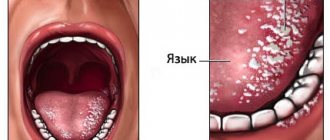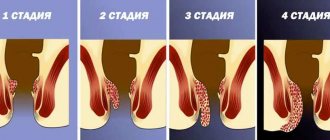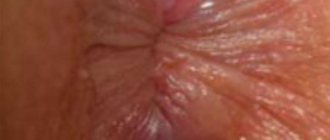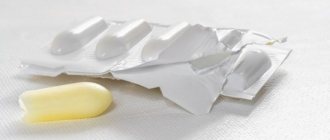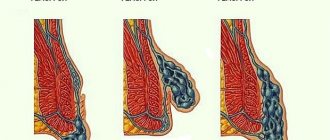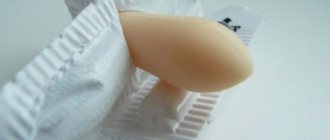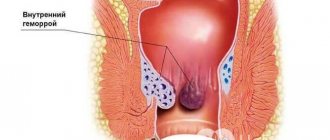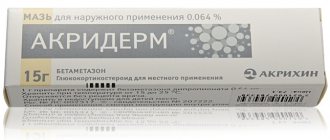Ointment for hemorrhoids during pregnancy is an effective and safe way to treat hemorrhoids, both external and internal. Such drugs are easy to use, penetrate deeply and quickly into damaged tissues, and alleviate local manifestations of the disease. At the same time, systemic absorption of the components included in the ointments is minimized.
It is worth considering that not all medications for external use are suitable for pregnant and lactating women. Therefore, in order to reduce the risks of adverse effects and possible complications for the fetus and the mother’s body, when using this or that drug, consultation with the attending physician is necessary, even if the instructions do not include the pregnancy period as a contraindication.
Anti-inflammatory and antibacterial ointments
It is advisable to use drugs in this group for acute types of hemorrhoids, severe inflammatory processes and prolapse of hemorrhoids. Various active substances included in the composition of the products help to quickly relieve swelling, heal tissue and eliminate pathogenic microorganisms that, with severe irritation, can infect small wounds and cause them to fester.
Ichthyol ointment
The product has a wound-healing and antibacterial effect. Quickly heals small wounds and cracks in the anal area. Relieves swelling and inflammatory processes in tissues. The components of the drug do not penetrate into the general bloodstream of the body, which reduces the risk of possible side effects to a minimum.
Indications
- Inflammation with external hemorrhoids.
- Anal fissures.
Contraindications
Sensitivity to ichthammol. The components of the drug are incompatible in solutions with iodide salts and salts of heavy metals.
Dosage
Apply a thin layer (1 g) to the affected area 2 times a day, in the morning and evening.
Ichthyol ointment can be used at any stage of pregnancy.
Gepatrombin G
The cream has a light consistency, is absorbed well and quickly, and has a strong anti-inflammatory effect. It also prevents the formation of blood clots in the veins, eliminates capillary fragility and restores elasticity to the vascular walls.
Indications
- Acute external and internal hemorrhoids.
- Ulcerations of the anus, fissures.
- Stagnation of blood, blood clots in the veins of the anal area.
Contraindications
If the skin and mucous tissues are damaged by bacteria, infections or fungi, the use of the cream is strictly prohibited. The components included in its composition can enhance the growth and division of pathogenic microflora, which will aggravate the situation and can provoke even more severe inflammation. You should also use the ointment with caution if you are predisposed to bleeding and with tumors of various etiologies.
Dosage
The cream is applied to the problem area in a thin layer (1-2 g) 2 to 4 times a day. For acute forms of hemorrhoids, it is advisable to use the ointment together with suppositories for greater effect.
Pregnant women can use the ointment only after the first three months of pregnancy.
Gepatrombin G is also available in the form of suppositories. You can read more about the use of Gepatrombin G ointment and suppositories for hemorrhoids here.
Heparin ointment
The drug has a strong anti-inflammatory effect and provides good prevention against the formation of blood clots in blood vessels. If there are small vascular formations, it promotes their rapid resorption.
Indications
- External hemorrhoids.
- Inflammation, enlargement of external hemorrhoids.
- Prevention of blood clots in the veins of the anal area.
Contraindications
- Heavy bleeding or scanty spotting (heparin, which is part of the ointment, prevents blood clotting, which can only worsen the situation).
- Ulcers, erosions, fissures in the anal area.
- Threat of miscarriage.
- Recent birth, last weeks before birth.
Dosage
Heparin ointment is used in quantities recommended by your doctor. It depends on the patient’s age, indications, general physiological condition and existing contraindications.
The use of ointment for hemorrhoids during pregnancy is permitted only on the advice of the attending physician and under his strict supervision, excluding overdose. The product has many side effects and contraindications, so its independent use by a pregnant woman, especially in the first 12-13 weeks, is prohibited. The heparin contained in the product thins the blood, which can cause severe uterine bleeding during childbirth.
Vishnevsky ointment
Vishnevsky ointment eliminates inflammation and swelling of damaged tissues, stops purulent processes in tissues and disinfects them.
Indications
- Acute hemorrhoids.
- Inflammation of external hemorrhoids.
- Fissures in the anal area.
Contraindications
Individual intolerance.
Dosage
The ointment is applied to the hemorrhoids and the area around them in a thin layer no more than 3 times a day.
During pregnancy, the product can be used at any stage, as well as during lactation.
Fleming's ointment
A drug made from plant extracts of St. John's wort, yarrow and sea buckthorn. Has a strong anti-inflammatory and antibacterial effect.
Indications
- External hemorrhoids 1st and 2nd degree.
- Skin dermatitis.
Contraindications
Allergic reactions to the components of the drug are possible.
Dosage
Fleming's ointment is applied to inflamed tissues 1 to 3 times a day no more. Duration of treatment is 5-7 days. A repeated course of treatment is prescribed only by a specialist.
There are no contraindications for use in any trimester of pregnancy or during breastfeeding.
Posterisan
The product has a strong anti-inflammatory effect. Promotes the restoration of tissue cells in the affected area, which accelerates the healing of anal fissures, ulcers, and reduces swelling during inflammation of thrombotic formations. The ointment also relieves the discomfort that occurs with acute hemorrhoids: itching, burning.
Indications
- Discomfort in the anal area.
- Discharge due to inflammation and enlargement of hemorrhoids.
- Eczema, ulceration of the rectum or anus.
Contraindications
The ointment contains phenol. If you have any allergic reactions to this chemical element, the use of the product is contraindicated.
Dosage
The ointment is applied in a thin layer (no more than 2 g or over a skin area of no more than 4 cm2) to the affected areas of the skin or mucous membrane. The procedure is performed in the morning and evening. The product can be injected into the lower rectum using a screw-on applicator.
Ointment for hemorrhoids during pregnancy can be used at any stage.
Levomekol
Ointment with a strong antibacterial effect. Can also be used for external hemorrhoids during pregnancy. The ointment contains the antibiotic levomethicin, which accelerates tissue renewal and restoration and eliminates pathogenic microorganisms that cause purulent processes.
Indications
- Cracks (including long-term non-healing ones) of the anal area.
- Wounds, ulcerations, erosions, anal ulcers.
- Severe irritation in the anal area.
Contraindications
Hypersensitivity to the components of the drug.
Dosage
Levomekol ointment is applied in a thin layer to damaged tissues after hygiene of the anal area. The drug is used before bedtime.
Despite the fact that the ointment has no contraindications for use during pregnancy, you should definitely consult your doctor before using it, since it contains an antibiotic.
What ointments do doctors usually recommend?
Ointments occupy a special place in the fight against hemorrhoids. In addition to heparin ointment, which promotes rapid resolution of blood clots, medical specialists often prescribe Relief. The basis of the second ointment is oil obtained from shark liver - a rather exotic component. Relief is considered unique in the sense that it has virtually no side effects during its use. Troxevasin is not far behind Relief in terms of popularity. It quickly removes swelling, Troxevasin strengthens the walls of blood vessels, relieves itching, burning, and irritation of the skin around the anus. During pregnancy, hemorrhoids do not heal for a long time and often become inflamed. Troxevasin helps fight inflammation.
Vishnevsky ointment is often referred to as a classic treatment for hemorrhoids. It is used to treat people of all ages. Can Vishnevsky ointment be used during pregnancy? Medical specialists give a positive answer. The ointment can be used by pregnant women. It helps a lot when external hemorrhoids fester or become inflamed. Vishnevsky ointment is also used to treat hemorrhoids in the postpartum period, because its components do not negatively affect the condition of mother’s milk and the baby receiving it. During pregnancy and after it, women's immunity is significantly reduced. To bear a child, a decrease in the protective reaction is necessary so that the body does not reject the fetus. After childbirth, the previous level of immunity is restored rather slowly. It is precisely when the body’s defense response is reduced that Posterizan is widely used. The ointment relieves pain and inflammation. It helps accelerate cell regeneration in the affected area.
https://youtu.be/354FTz8Sn9w
During pregnancy, the use of Luan and Emla ointments is not prohibited. They have a strong analgesic effect, relieve pain symptoms and discomfort during bowel movements. Both doctors and patients respond positively to Fleming's ointment, which has no contraindications for use. It belongs to the category of homeopathic medicines and can be used during pregnancy and lactation. Like most ointments, it goes well with candles. Traditional medicine offers its own options for external remedies for pregnant women. Homemade ointments include propolis, which is also actively used by pharmacists.
Vasoconstrictor and tonic ointments
It is advisable to use the drugs for thrombosis of hemorrhoids, when blood circulation in the tissues is severely impaired. Ointments containing tonic substances restore the elasticity of the venous walls and improve blood flow. The products can also be used for minor bleeding. Having a vasoconstrictor effect, they stop bleeding and promote healing of fissures in the anal area.
Relief
Relief hemorrhoid ointment, which has a regenerative and strong vasoconstrictor effect, also has a mild anti-inflammatory effect, relieving itching, irritation and burning in the anal area.
Indications
- Hemorrhoids of external and internal type.
- Anal fissures.
- Itching, burning, discomfort in the anorectal area.
Contraindications
- Hypersensitivity to the components included in the ointment.
- Thromboembolism (blockage of blood vessels with blood clots).
- High blood pressure.
Dosage
The ointment is spread in a thin layer over the area of the affected tissue outside (if necessary, inside) the anus. Recommended dosage: morning, evening; in the acute form of hemorrhoids - in the morning and evening and after each passage of feces.
The use of ointment for hemorrhoids during pregnancy is possible only in consultation with a specialist. There is evidence that using the product in the early stages of pregnancy can cause miscarriage, as it increases the tone of the uterine muscles. It is also not recommended to use the ointment immediately after childbirth; there is a risk of increased bleeding.
Troxevasin
A complex drug that has a venotonic effect. The ointment relieves swelling of inflamed tissues, eliminates excessive fragility of capillaries, and restores elasticity to the vascular walls.
Indications
- "Weeping hemorrhoids."
- Inflammation of external hemorrhoids.
Contraindications
- Allergy to the components of the drug.
- Deep wounds.
- Symptoms of bacterial infection of mucous membranes and skin.
Dosage
The ointment is applied in a thin layer directly to the affected area or a piece of gauze is soaked in it and applied to the hemorrhoids. The drug should not be applied to mucous membranes, bleeding wounds and cracks. The procedures are performed 2 times a day, best in the morning and before bedtime.
The ointment can be used in any trimester of pregnancy.
Troxerutin (analogue of Troxevasin)
An ointment with a venotonic effect. Restores the elasticity of vascular walls, normalizes blood supply to damaged tissues, prevents the formation of blood clots and stagnation of blood in inflamed hemorrhoids, due to which swelling quickly subsides.
Indications
- Inflammation of external hemorrhoids.
- Discomfort in the anal area.
- Postoperative tissue swelling.
Contraindications
- Wounds, erosions on the skin.
- Allergy to the components of the drug.
Dosage
The ointment is used only externally, applying a thin layer to the affected areas. In this case, the treatment area should not be more than 3-4 cm. The ointment is applied in an amount of 1-2 g in the morning and evening.
The use of Troxerutin in the first trimester of pregnancy is contraindicated. In the 2nd and 3rd trimester, the use of the drug is permitted.
Simple but effective
Drugs for severe inflammation and infection:
- The popular Vishnevsky ointment can also be safely used during pregnancy, however, this drug has special indications: inflammation and suppuration of nodes and underlying tissues. However, in such situations it is better not to take risks and not self-medicate, but to consult an experienced specialist. Typically, a cotton swab, generously lubricated with Vishnevsky ointment, is placed in the rectum for a period of 30 minutes. up to several hours.
- Levomekol ointment can also be used for severe inflammation. Inserted into the anus on a tampon for 60–120 minutes.
- Ichthyol ointment, well known to our grandmothers, is also safe and effective during pregnancy, when the “bumps” become enlarged and become infected. However, it is better to use this drug in combination with other drugs for greater effectiveness.
Herbal preparations:
- Fleming ointment is a 100% natural product that contains witch hazel, aesculus, calendula, menthol and zinc oxide. Zinc oxide helps dry out “wet” areas and promotes speedy healing. Menthol – cools the tissues for some time after applying the ointment. The remaining components in combination have proven themselves to be an effective remedy for the treatment of hemorrhoids. Reviews from women who used this drug during pregnancy confirm the effectiveness declared by the manufacturer.
- “Zdorov” cream for hemorrhoids is also developed on the basis of natural ingredients and includes wax. This product is safe and effective to use during pregnancy, if the woman does not have allergic reactions to bee waste products.
- Propolis-based ointment has anti-inflammatory and antimicrobial effects.
- Ointment based on calendula flowers. This drug has anti-inflammatory and bactericidal effects for hemorrhoids. Typically, calendula ointment is used for inflammation of nodes to suppress pathogenic bacteria. It is advisable to use together with drugs that have a healing effect.
- “Bezornil” ointment is very popular among herbal medicine lovers; it contains borneol, calamine, pearls, benzoar, amber and solid fats. The manufacturer claims complex anti-inflammatory, decongestant, antipruritic, hemostatic and regenerating effects. Reviews from proctologists show their skeptical attitude towards this drug.
Hemorrhoids often complicate the course of pregnancy, even if the woman has never previously noted the appearance of symptoms of this disease.
The process of treating hemorrhoids during pregnancy should be treated with increased responsibility, since improper use of drugs or the use of products whose effectiveness can be questioned can harm the health of not only the mother, but also the child. comments powered by HyperComments
Pain relieving ointments for hemorrhoids
The drugs are used for acute and chronic external hemorrhoids, for pain during and after the passage of stool. Ointments with an analgesic effect should also be used during various diagnostic procedures.
Procto-Glyvenol
Ointment for hemorrhoids, which has an analgesic and anti-inflammatory effect. The drug reduces bleeding, restores normal blood circulation in damaged tissues, reduces the fragility of capillaries and blood vessels, restoring their elasticity.
Indications
- Hemorrhoids of any type.
Contraindications
Liver failure.
Dosage
The ointment is spread in a thin layer over the area of the affected tissue. For internal hemorrhoids, the drug is administered into the lower rectum in an amount of 1 g using an applicator. Procedures are performed in the morning and evening.
The ointment can only be used in the 2nd and 3rd trimester after approval from a specialist. Use in the first 12-13 weeks of pregnancy is prohibited.
More information about the drug Procto-Glivenol can be found here.
Relief Advance
Ointment for hemorrhoids during pregnancy, which has a strong local anesthetic effect, also has an anti-inflammatory effect. The drug relieves itching and discomfort in the anal area due to inflamed hemorrhoids, and heals small cracks in the anal area.
Indications
- Hemorrhoids of any type.
- Erosions, ulcers of the anus.
- Discomfort in the anal area: itching, burning.
- Use during diagnostics as an anesthetic.
Contraindications
- Tendency to form blood clots (thromboembolism).
Dosage
The ointment is applied to damaged tissue or injected into the rectum using a special applicator. All actions are carried out only after hygiene procedures. For severe pain, the ointment is used up to 4 times a day. During the day, you can make compresses by soaking a gauze pad with the preparation and applying it to the sore spot.
During pregnancy, the ointment is used with extreme caution on the recommendation of the attending physician. According to some reports, the drug can increase the tone of the uterus, which is very dangerous in the first and last trimester of pregnancy, as there is a high risk of miscarriage and premature birth. It is also not recommended to use the ointment immediately after childbirth; there is a risk of increased bleeding.
Medicines with anesthetic effect
Creams for hemorrhoids during pregnancy with an anesthetic effect are prescribed to women during exacerbation of the disease or severe pain. Medicines are used during or after the passage of stool.
These drugs are recommended to be applied to the anal area during diagnostic procedures for hemorrhoids in pregnant women.
What ointment do doctors prescribe?
For hemorrhoids, three drugs with an anesthetic effect are prescribed for pregnant women: Procto-Glivenol, Relief Advance, Bezornil.
Procto-Glyvenol
Cream-ointment against hemorrhoids is often prescribed for pregnant women. The components of the drug have a local effect, are not absorbed into the bloodstream, and are safe for the fetus.
Procto-Glyvenol is contraindicated for use:
- in the 1st trimester of pregnancy;
- during lactation;
- with hypersensitivity to the components of the medication;
- in the presence of liver failure.
Instructions for using rectal cream were compiled by qualified proctologists, but this does not mean that the medicine can be applied without medical advice.
Procto-Glivenol is used for the treatment of internal and external hemorrhoids in acute or chronic form.
Action of the medication:
- restores blood circulation in affected areas;
- improves capillary permeability and vascular tone;
- has a local anesthetic effect, causing a rapid weakening of the symptoms of the disease.
Hemorrhoid cream is used rectally during pregnancy. Apply the medicine twice a day. One tube (30 g) is enough for 20–30 applications.
Relief Advance
The medication has a strong analgesic effect and prevents the development of the inflammatory process.
Relief Advance promotes:
- relieving itching;
- healing of anal fissures;
- mitigation;
- narrowing of blood vessels;
- eliminating congestion in hemorrhoids.
The drug is prescribed to treat the disease and carry out diagnostic measures.
The drug can be used in pregnant women if the benefit to the mother outweighs the potential risk to the fetus.
Relief Advance is contraindicated for use in case of individual intolerance to the components, granulocytopenia, thromboembolic disease. In the first and third trimester of pregnancy, the use of the medication is strictly prohibited. The medicine can only be prescribed in the 2nd trimester.
Mode of application. For hemorrhoids for pregnant women, this medication is used up to 4 times a day. The medicine is sold with a special applicator, which means Relief Advance can be applied to internal nodes.
Side effects:
- itching;
- rash;
- contact dermatitis;
- skin cyanosis;
- headache and dizziness;
- tachycardia.
Relief Advance should be discontinued if bloody discharge from the anus appears.
Bezornil
An antihemorrhoidal agent is used in the complex treatment of anal fissures and nodes.
Bezornil has the following effects:
- relieves swelling;
- has a local astringent effect;
- relieves pain;
- disinfects.
The only side effect is an allergic reaction. Bezornil is contraindicated for use by girls under 18 years of age.
The combined drug was produced according to the recipes of Chinese healers. Bezornil for hemorrhoids for pregnant women is prescribed in any trimester, but only if the doctor allows it.
The medication is used rectally for internal and external nodes. Bezornil is applied to the affected area 2 times a day. The duration of therapy is 2 weeks.
If it is necessary to continue the course of treatment, you should consult a doctor. Reuse of Bezornil is determined on an individual basis.
Available without a prescription. Reviews from patients confirm the good tolerability of the medication and its effectiveness in the treatment of hemorrhoids.
Related articles:
Viferon for hemorrhoids: action and application, analogues, price Medicine for hemorrhoids for men: types and method of application Vitaprost for hemorrhoids: action and application, analogues, price Ointment for hemorrhoids - drugs: action and application, price Diclofenac ointment: description, action and method of use, price
Allowed ointments for hemorrhoids during pregnancy
| A drug | Indications for use during pregnancy | |||
| 1st trimester | 2nd trimester | 3rd trimester | ||
| Heparin ointment | No | as prescribed by a doctor | No | |
| Ichthyol ointment | Yes | Yes | Yes | |
| Gepatrombin G | No | Yes | Yes | |
| Vishnevsky ointment | Yes | Yes | Yes | |
| Fleming's ointment | Yes | Yes | Yes | |
| Posterisan | Yes | Yes | Yes | |
| Levomekol | allowed on doctor's recommendation | |||
| Relief, Relief Advance | No | as prescribed by a doctor | No | |
| Troxevasin | Yes | Yes | Yes | |
| Troxerutin | No | Yes | Yes | |
| Procto-Glyvenol | No | Yes | Yes | |
Causes of hemorrhoids in pregnant women
For pregnant women, the development of hemorrhoids is a common occurrence. This is explained by the fact that the pregnant woman’s body undergoes changes and goes through a certain restructuring. The pelvic bones unfold, resulting in the greatest flow of blood to the pelvic organs.
In this case, the rectum, located in the pelvic area, is also exposed. As the uterus increases in size, pressure increases and venous circulation is disrupted. The consequence of this process is the formation of blood stagnation.
Pregnant women suffer not only from hemorrhoids. Constipation is a fairly common pathology that expectant mothers have to deal with. The reason is that, against the background of increasing tone of the uterus, the tone of the muscle walls in the rectal region decreases. All these processes are a protective reaction of the body aimed at preventing premature birth.
It should be taken into account that pregnant women experience changes in activity and nutrition - there is a decrease in physical activity and a change in taste preferences. All this leads to a decrease in the tone of the rectal muscles, resulting in constipation.
Useful tips
To reduce swelling and relieve irritation with external hemorrhoids, you can use some folk remedies:
- Sitz baths. For them, use a weak solution of potassium permanganate. You can prepare a decoction of nettle, chamomile and plantain. 20 g of the dry mixture is poured with boiling water (2 liters) and kept for 2 hours or boiled in a water bath for half an hour, filtered and added to warm water for baths in the amount of 2 liters of decoction per 5 liters of water.
- Compresses. For pain, moisten a gauze pad with cold water and apply to the inflamed area for 2-3 minutes. A piece of gauze can also be soaked in sea buckthorn oil and applied to the inflamed nodes, changing the compress every 2-3 hours.
But medications are more effective because they contain a complex of various substances. When using any ointment for hemorrhoids for pregnant women, personal hygiene must be carefully observed. Preparations for external use must be applied to clean skin of the anus. Therefore, after any act of defecation, it is best to wash the anal area with warm water. It is advisable to use almost all products in the morning and evening, unless otherwise stated in the instructions.
Ointments for hemorrhoids during pregnancy belong to the group of topical drugs that have a quick effect. Despite the fact that many of them are indicated for use during pregnancy, you should first consult with a specialist in order to minimize possible risks, complications and side effects.
Medicines must be harmless
For internal and external forms of hemorrhoids, various conservative methods of combating the disease are used. But all remedies for hemorrhoids during pregnancy certainly have one thing in common: they must be harmless to the woman and the baby in her womb. The occurrence of hemorrhoids in a woman in labor is provoked by a number of factors. Conventionally, they can be divided into three groups:
- dysfunction of the circulatory system;
- problems with the normal functioning of the digestive system (including constipation);
- a changed lifestyle, including a decrease in physical activity.
The best medicine to help combat the last group of causes of hemorrhoids is physical activity commensurate with the woman’s health condition and stage of pregnancy. Physical therapy exercises will help improve the functioning of the body, but it is still impossible to cope with the disease without medications. Folk remedies for hemorrhoids for pregnant women are effective, but it is important to consider that they are auxiliary, and not the main ways to counteract the disease.
As a rule, medications taken internally are not prescribed to pregnant women, because they can cause irreparable harm to the health of the unborn baby. The placenta is not an absolute barrier to medications; it is through it that they enter the fetus’s body. The main emphasis in the treatment of the disease is on external medications for hemorrhoids, applied topically. Their use must certainly be accompanied by dietary correction, exclusion of constipating foods, and stricter personal hygiene. Hemorrhoids develop through several stages, each of which is characterized by distinctive symptoms. The selection of a set of remedies against hemorrhoids directly depends on how the disease progresses.
Instructions for use of ointments
Before starting treatment, you need to carefully read the instructions for using ointments or suppositories. To treat external bumps, it is enough to use the remedy several times a day after hygiene procedures.
Apply the ointment using light, massive movements to the affected area. You can use napkins for application.
Candles are suitable for indoor use only. It's better to put them on at night, before bed. It is enough to apply once a day.
If the doctor offers several ointments to choose from, you can consult with other pregnant women.
Modern medicine has a wide range of treatments for hemorrhoids in pregnant women, taking into account their safety for the baby. However, before using this or that product, you should consult a doctor.
What ointments are not recommended during pregnancy
As noted above, ointments as a dosage form are the safest remedy, as they act locally. But for most of them, the effect on the course of pregnancy has not been reliably studied, since relevant studies have not been conducted. In general, manufacturers indicate in their instructions that such products should be used with caution and only when the benefit outweighs the potential risk. Also, doctors do not recommend expectant mothers to use ointments that contain hormonal components. Drugs with glucocorticoids are prohibited in the first trimester, as some scientists suggest that these substances provoke the development of cleft palate in the child. The prohibition on use during gestation is contained in the instructions for the following popular products:
- Proctosan;
- Proctosedyl.
The instructions for Proctosan ointment contain a ban on its use during pregnancy.
In the first trimester, the use of ointments is contraindicated:
- Aurobin;
- Gepatrombin G.
What to do if you unknowingly used a prohibited drug
If a woman was unknowingly treated with prohibited drugs, then the doctor should be informed about this. At the same time, according to the famous obstetrician-gynecologist Elena Berezovskaya, you should not panic. You just need to stop using this medication and replace it with another, safer one. If necessary and desired, you can undergo genetic screening and ultrasound. With their help, up to 90% of all developmental defects can be detected. Dr. Evgeniy Komarovsky recommends not to self-medicate in order to avoid such situations, but if such a problem arises, he advises consulting with a geneticist.
If the doctor has any doubts about whether it is possible or not, know that the most competent specialists who have full knowledge of the admissibility of taking certain medications by a pregnant woman work in medical genetic consultations.
E.O. Komarovsky
"Medicines and Pregnancy"
Special means
When treating hemorrhoids during pregnancy, two types of drugs are used: for local and for systemic effects. The first option (ointments, creams and suppositories) is more effective during pregnancy.
Local treatment reduces the side effect that is dangerous for the child. Such medications quickly relieve pain, swelling and inflammation, restore blood flow in the intestine, prevent the development of blood clots, relax the sphincter, improve intestinal function, and thin stool.
Physiotherapy
Exercises increase muscle tone in the abdominal region, improve intestinal function, and reduce blood stagnation. It is advisable to do gymnastics at least in the morning and evening.
- Walking with legs raised high and knees bent;
- Swing your legs alternately: back and forth and to the sides - you can hold on to a chair;
- Torso bends;
- Tension of the buttocks with parallel retraction of the anus;
- Squats on toes (knees wide apart).
It is convenient to place medications for hemorrhoids for pregnant women in a table.
| Name | Indications | Restrictions | Mode of application |
| Suppositories with cocoa butter, lanolin and anesthetics | Anesthetizes, soothes. | Individual intolerance to components | Administer after emptying the intestines, lying on your side. |
| Prednisolone | Reduces inflammation, itching, burning, allergies. | Viral and fungal infections of the intestines. Not prescribed in the first trimester. | The ointment is applied in a thin layer 3-4 times a day, after hygiene. |
| Products with heparin | Prevents the appearance of blood clots, relieves swelling, enhances tissue regeneration. | Poor blood clotting. | The candles are not pushed with force, but are held at the entrance for 2 minutes until dissolved. |
| Suppositories with diphenhydramine, carotene, shark liver, sea buckthorn suppositories | Relieves sphincter spasm, speeds up wound healing | There are no contraindications | The candle from the refrigerator should be kept warm. |
| Anestezol, Ultraproct, Procto-Glivenol | Complex analgesic, astringent and wound healing effect | Lidocaine can cause bradycardia and fetal hypoxia | Use as needed, periodically |
| Gepatrombin G based on heparin, prednisolone and anesthetic | Relieves itching, inflammation, spasms, prevents blood clots | Not recommended for long-term use if there is a risk of miscarriage | Can be reapplied multiple times throughout the day |
| Relief Advance with shark liver oil and benzocaine | Relieves inflammation, relieves pain, stops bleeding | Not recommended for hypertension | Can be applied up to 4 times daily |
| Troxevasin Troxerutin | Strengthens the tone of veins, relieves pain and swelling, indicated for dense nodes | Suitable for all stages. | 1-2 times a day, the gel is applied on a gauze bandage. |
Local medications can cause allergies. If after a week there is no positive trend, you need to get tested again. To provoke a miscarriage, use suppositories with belladonna (Anuzol, Bellataminal).
Remedies for hemorrhoids during pregnancy, intended for systemic treatment, are prescribed in the form of capsules or tablets.
Very often, the joyful period of waiting for a baby is denigrated by the painful symptoms of hemorrhoids. Treatment of this disease in pregnant women should be carried out with extreme caution so as not to harm the fetus.
The safest and most effective remedy in this case is ointment for hemorrhoids during pregnancy. The safety of this dosage form is explained by the locality of action, since the active ingredients of the drug do not penetrate into the general circulation and, accordingly, through the placenta.
In this topic, we want to tell you what ointment for hemorrhoids during pregnancy can be used without fear for your health and the condition of the fetus. But first, we will look at why expectant mothers are at high risk for developing hemorrhoids and by what signs the disease can be recognized.
Relief
Suppositories for hemorrhoids during pregnancy and Relief ointments are very popular. Suppositories are prescribed for internal hemorrhoids, and ointment for external hemorrhoids. There are several types of Relief candles. Which one is best to use depends on your symptoms. Can be used by pregnant and lactating women.
Relief contains fats and shark liver oil. It has anti-inflammatory and healing properties, improves immunity.
Different forms of release of Relief allow you to combine them with each other, which increases efficiency. Relief cream helps well with swelling. It has a vasoconstrictor effect, removes swelling, and relieves inflammation.
Which candles to choose? Relief Advance suppositories contain benzocaine, which relieves pain. Therefore, they are prescribed to patients with severe pain syndrome.
Relief Ultra is supplemented with zinc and a local hormonal component. These suppositories quickly relieve inflammation, dry out the node and stop bleeding.
Using ointment and suppositories at the same time speeds up the treatment process. Relief is also intended for the prevention of hemorrhoids, it softens stool and prevents constipation.
